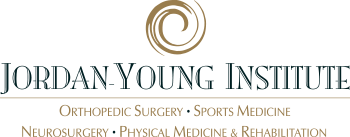During “normal” (pre-COVID-19) times, patients often wait far too long to consider a more permanent, surgical solutionto their severe and/or persistent joint or back pain. Conservative non-surgical treatments, including creams, exercise, physical therapy and injections will provide some relief, but often not enough or long-lasting. Patients typically seek orthopedic or spine surgery when they can no longer tolerate or function with their level of pain.
As COVID-19 cases continue to rise across the country, many patients are even more reluctant to pursue having surgery, postponing to a later date or cancelling altogether. As we continue to learn more about COVID-19 detection and prevention, we are confident that we can safely provide orthopedic and spine surgeries. While this new virus will continue to be among us for some time, know that we will continue to place your safety as our highest priority.
If you're considering an orthopedic or spine surgery, please know that Jordan-Young Institute and Sentara hospitals are safe, taking extra precautions. These include:
- Requiring all patients, visitors and employees to wear masks at all times
- Screening all patients, visitors and employees upon arrival to the practice/facility
- Isolating COVID-19 patients from other patients in the hospital, allowing us to treat everyone safely
- Practicing social distancing in our waiting rooms
- Limiting the number of people in our facilities
- Utilizing video/telemedicine visits to reduce patient traffic
- Increasing housekeeping and vigilance in our disinfection protocols
- Testing every patient for COVID-19 prior to surgery, postponing surgeries for COVID-positive patients
While the majority of orthopedic and spine surgeries are considered elective surgeries and there's not necessarily a medical rush to have the surgery, the decision to proceed with surgery — sooner than later — will eliminate the pain and suffering of a prolonged waiting period.
The new coronavirus is going to be with us for some time, and your doctor can help you understand if a surgery is right for you, as well as discuss any fears or concerns you may have about the procedure or timing during COVID-19.
